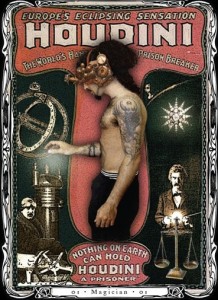Mysterious, But Not Magical
 I listened to a talk by Phillip Moffitt last night, given at the opening of a retreat being held right now at Spirit Rock. The talk is primarily an overview of the practice, with particular emphasis on the “non-doing” aspect of what we’re “doing” when we practice. We practice with intention. But what happens as a result of our practice, is beyond our control.
I listened to a talk by Phillip Moffitt last night, given at the opening of a retreat being held right now at Spirit Rock. The talk is primarily an overview of the practice, with particular emphasis on the “non-doing” aspect of what we’re “doing” when we practice. We practice with intention. But what happens as a result of our practice, is beyond our control.
“It’s so mysterious,” he says, “but it’s not magical.”
By which I take him to mean that the practice unfolds in an orderly fashion, but not of an order that is easy to discern.
“We sit in stillness, without expectation,” he says. “And all eventually opens of its own accord.”
At the end of the talk, Phillip reads a passage from the Four Quartets, by T.S. Eliot. He says that these are the lines that during a very difficult time of his life — which lasted for a couple of years — gave him the presence to continue:
“I said to my soul, be still, and wait without hope
For hope would be hope for the wrong thing; wait without love
For love would be love of the wrong thing; there is yet faith
But the faith and the love and the hope are all in the waiting.
Wait without thought, for you are not ready for thought:
So the darkness shall be the light, and the stillness the dancing.”
***
Click here to listen to the talk.
Just Beginning or Beginning Again
 I had a friend ask me yesterday to recommend a good, basic talk on meditation and I couldn’t come up with just one, but I did find a separate page on Dharma Seed, under the title Introduction to Meditation, with four introductory talks by four terrific teachers. How cool!
I had a friend ask me yesterday to recommend a good, basic talk on meditation and I couldn’t come up with just one, but I did find a separate page on Dharma Seed, under the title Introduction to Meditation, with four introductory talks by four terrific teachers. How cool!
And then I thought it would be a good idea to have these talks “at the ready” — not only for the next time someone is interested in beginning meditation, but also for all those times when the practice seems to get kind of “stale” or I get confused or (even more likely) I find myself thinking that I already know it all. (A major red flag!)
Here are the talks:
(1) Introduction to Meditation Practice, by Steve Armstrong
(2) What Changes Us in Spiritual Life, by Jack Kornfield
“The long and winding road and how the unexpected offers profound teachings.”
(3) Thoughts on Practice and Why We Do It, by Pascal Auclair
(4) Introduction to Meditation, by Thanissara
“A cultivated mind: a cause for happiness. Samadhi: a gathered mind. Entry into the first foundation of mindfulness.”
“There Is A Body”
 The first part of the annual 3-month retreat has started at IMS (Insight Meditation Society in Barre, MA) and I have to admit I’m feeling a bit wistful. This time last year I was there and I remember the excitement, the curiosity, the sense of embarking on an important inner journey. So last night I started listening to this year’s talks, which are now beginning to appear on Dharma Seed. (Click here.)
The first part of the annual 3-month retreat has started at IMS (Insight Meditation Society in Barre, MA) and I have to admit I’m feeling a bit wistful. This time last year I was there and I remember the excitement, the curiosity, the sense of embarking on an important inner journey. So last night I started listening to this year’s talks, which are now beginning to appear on Dharma Seed. (Click here.)
If you don’t have time to listen to them all (smile), you might consider just listening to the Opening Morning Instructions given by Joseph Goldstein. The instructions are similar to the ones he gave last year — offering an Open Awareness technique, using this line from the refrain in the Satipatthana Sutta:
Mindfulness that “there is a body” is established in him to the extent necessary for bare knowledge and continuous mindfulness.
Don’t be put off by the length of the “tape,” which runs just under 43 minutes. Joseph’s instructions are given during the first 10 minutes. The rest of the tape is silence. (Click here.)
How to Change the Channel
 Last night one of my Dharma buddies and I listened to the opening talk given by Akincano Marc Weber at the month-long retreat held this past August at the Forest Refuge. We’d already listened to a few of the talks from that retreat, and they were so good, that now we’ve decides to listen to all of them, in the order they were given.
Last night one of my Dharma buddies and I listened to the opening talk given by Akincano Marc Weber at the month-long retreat held this past August at the Forest Refuge. We’d already listened to a few of the talks from that retreat, and they were so good, that now we’ve decides to listen to all of them, in the order they were given.
The talk last night was a fresh take on the well-known Satipatthana Sutta (also known as the Discourse on the Four Foundations of Mindfulness), which is also the basis of Joseph Goldstein’s new book, Mindfulness: A Practical Guide to Awakening.
In this talk, Akincano looks at the four Foundations of Mindfulness as if they were four “channels” — ways in which we experience the events in our lives — and proposes a way to use them “not as meditation exercises, but as a model of human experience.”
These four Foundations/Channels can be understood as “somatic awareness” (body), “hedonic awareness” (vedana, or feeling tone), “affective awareness” (emotions, moods, and other mind states) and “cognitive awareness” (dhammas, or the mental activities of thoughts, concepts, images and ideas).
I found it to be quite a fascinating — and helpful — way of looking at these teachings. Click here to listen.
Not Just “Watching”
 Meditators are often instructed to “watch” or “observe” their breath….or emotions, body sensations, mental states, etc. But using a visual metaphor for mental investigation can have an unconscious effect on the type of attention we bring to our meditation object. When we are “sniffing things out,” for example, there’s a very different feel than when we are “looking at” something. And the same goes for “listening to,” “tasting,” and “touching.
Meditators are often instructed to “watch” or “observe” their breath….or emotions, body sensations, mental states, etc. But using a visual metaphor for mental investigation can have an unconscious effect on the type of attention we bring to our meditation object. When we are “sniffing things out,” for example, there’s a very different feel than when we are “looking at” something. And the same goes for “listening to,” “tasting,” and “touching.
This was brought very beautifully to my attention last night as I listened to a wonderful little talk by Akincano (who has recently become of one my all-time favorites on DharmaSeed). In this talk — which is only 26 minutes long — he also gives three very helpful ways to approach an intimate investigation into our thoughts, emotions and other mind-states (cittanupassana). Click here to listen.
Always Stillness, Always Movement
 Today’s post is prompted by an interesting email conversation I had the other day with one of my Dharma buddies (thanks, Lori) about the practice of turning one’s attention to the open, spacious, stillness of mind. If you are at all interested in this practice, listen to the last 5 minutes of this talk given by Phillip Moffitt at the recent Concentration Retreat.
Today’s post is prompted by an interesting email conversation I had the other day with one of my Dharma buddies (thanks, Lori) about the practice of turning one’s attention to the open, spacious, stillness of mind. If you are at all interested in this practice, listen to the last 5 minutes of this talk given by Phillip Moffitt at the recent Concentration Retreat.
“There is always stillness,” Phillip says, “and there is always movement.”
T.S. Eliot says it like this:
At the still point of the turning world. Neither flesh nor fleshless;
Neither from not towards; at the still point, there the dance
is,
But neither arrest nor movement. And do not call it fixity,
Where past and future are gathered. Neither movement
from nor towards,
Neither ascent nor decline. Except for the point, the still
point,
There would be no dance, and there is only the dance.
— from Burnt Norton, I, Four Quartets
The Secret Method
 Apparently last night’s Full Moon was especially big and bright. Unfortunately it was raining here in Chapel Hill, so I didn’t get to see it. Which was OK, because I knew it was there, just hidden. So I celebrated the Dark Full Moon by listening to several wonderful talks given by Akincano Marc Weber, currently at the Forest Refuge in Barre, MA.
Apparently last night’s Full Moon was especially big and bright. Unfortunately it was raining here in Chapel Hill, so I didn’t get to see it. Which was OK, because I knew it was there, just hidden. So I celebrated the Dark Full Moon by listening to several wonderful talks given by Akincano Marc Weber, currently at the Forest Refuge in Barre, MA.
All the talks were great, but the one I remember most is the one where he starts out: “Meditation is more than technique or method. There is no technique or method that is going to take you all the way. As indispensable and as powerful as techniques and methods are, no technique or method is going to make the mind free.”
And then he quotes cryptography and security expert Bruce Schneider (who he says is considered a “god” in his field): “If you believe technology is going to solve your problems, you do not understand your technology. And worse, you do not understand your problems.”
As someone who has a tendency to want to do things the “right” way, I found this talk to be quite liberating. You can listen to it here.
They Are and They Aren’t
 The Buddha said,
The Buddha said,
“Things are not what they seem. Nor are they otherwise.”
Intrigued?
Listen to Eugene Cash’s talk on the Paradox of Dharma. Click here.
A Very Full Moon Day
 The moon was full last night (or this morning, depending on your time zone), so I celebrated by spending the day watching the video recording of a one-day course taught by Sally Armstrong. The course was designed for experienced students, and it was titled Why Do We Suffer? An Exploration of the Buddhist Teaching on the 5 Khandas (usually translated as “Aggregates” or “Bundles”.)
The moon was full last night (or this morning, depending on your time zone), so I celebrated by spending the day watching the video recording of a one-day course taught by Sally Armstrong. The course was designed for experienced students, and it was titled Why Do We Suffer? An Exploration of the Buddhist Teaching on the 5 Khandas (usually translated as “Aggregates” or “Bundles”.)
OK, so that doesn’t sound like much of a celebration. But for me it was, because I’ve been missing the monthly conference calls we had with Sally that were part of the DPP program, and this was a way for me to get a little taste of that again.
There is a lot of material on this teaching and if you’re interested in really digging into it, I recommend The Five Aggregates: A Study Guide by Thanissaro Bhikkhu. Even the “basics” are not that simple, but here’s what I got from the course:
All human experience can be broken down into five groups (khandas) of activities. These are:
Form (rupa), which is the material aspect of the body. (Form doesn’t seem like an “activity,” but since every cell in our body is always changing/growing/wearing out/dying…we’re really not a static thing!)
Feeling Tone (vedana), which is the mental experience of simply knowing that something is pleasant, unpleasant, or neutral.
Perception (sanna), which is the mental experience of recognizing what we see/hear/touch/taste/smell and sense as a mental impression.
Volitional Formations (sankharas), which is really hard to define, but which I understand to be the various mental energies that activate patterns of thought and behavior.
Consciousness (vinnana), which, in this context, is simply the awareness that something is happening. (As in: you can’t hear a sound unless you are conscious.)
And what is the point of breaking human experience into these five groups? To be able to understand these experiences more accurately by looking at them separately, seeing how they impact and relate to each other, realizing that they are all governed by the natural law of cause and effect, and that none of them–individually or collectively–are the essence of who we really are!
Is It Pressure or Is It Stress?
 I listened to a delightful talk yesterday by Sally Armstrong, called Mindful Happiness. She refers to lots of studies, including recent scientific research that shows changes in blood chemistry after extended periods of meditation, but what comes to mind most clearly this morning, as I think about what I want to post, is an article she quotes by Phillip Moffitt, in which he distinguishes between pressure and stress. Here’s what he says:
I listened to a delightful talk yesterday by Sally Armstrong, called Mindful Happiness. She refers to lots of studies, including recent scientific research that shows changes in blood chemistry after extended periods of meditation, but what comes to mind most clearly this morning, as I think about what I want to post, is an article she quotes by Phillip Moffitt, in which he distinguishes between pressure and stress. Here’s what he says:
“Pressure is a natural response to the ‘weight’ or ‘heaviness’ of the demands in your life, which you experience in your body, particularly your nervous system… Pressure is like an internal messenger that is telling you, ‘Pay attention.’ You experience this message as a demand; it is this demand that constitutes the felt sense of pressure in your body and mind.
“Stress is a very different phenomenon. It is your mind’s fearful, anxious, and immediate reaction to the demands that you face. You may be reacting to demands that you are facing at this moment or ones that you anticipate will happen in the future. You may even be reacting to pressure you felt in the past that was so traumatizing that the memory of it triggers feelings of stress in the present. You may also be inflating how truly fearful the situation is or completely misperceiving what’s going on.”
***
So, for example, pressure is what you feel when you’ve got a lot of stuff to do and not a lot of time to do it in. Stress is your response to that feeling of pressure. It’s the: I can’t do this! It’s not fair! Why does all this stuff always get dumped on me all the time!!!!!
***
Phillip goes on to say:
“The first step in overcoming this reflexive reaction is to ask yourself: ‘Is this really stressful or am I simply feeling a lot of pressure?’
“You find the answer by assessing the particulars of the situation, clarifying what action is called for (while being realistic about what you are capable of doing), and accepting that there are times in life when you will feel pressure and the outcome is uncertain…. If it truly is a stressful situation and you are in danger or unable to function, then you need to take whatever steps are necessary to assure your safety.
“The second step is to be mindful of whether you are feeling stressed simply because you are under pressure. If so, you can remedy this in several ways:
“Begin with naming it as pressure and clarifying what the demand is. Then define the tasks involved and make a list of what is required of you to complete what needs to be done.
“Acknowledge the challenge that the pressure presents and work out a system of balancing it. Allowing yourself time to rest, eating healthy food, meditation, being in nature, engaging in physical activity, receiving body work, and getting involved in activities that give you joy can all help bring relief from stress.
“Find a support system (either a person or a group, professional or friends) to help you deal with the pressure.”
***
There’s more. Click here to read the entire article, titled Preventing Pressure from Becoming Stress.
